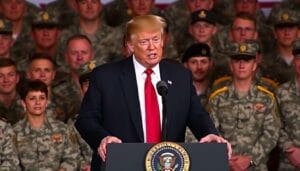Trump Promises to Pay Military During Shutdown
Discover how Trumps Promises to Pay Military might impact service members during the government shutdown. Stay informed on this vital development.

Trump Promises to Pay Military During Shutdown
Click to summarize this article.
Trump Promises to Pay Military During Shutdown: On government shutdown Day Nine, President Donald Trump said troops “don’t need to worry” about pay. He backed a stand-alone military pay bill to ensure checks continue flowing, even as agencies scale back. The next test comes with the Oct. 15 military payday for 1.3 million active-duty service members.
His pledge lands amid widening IRS furloughs and strain on daily operations. The Internal Revenue Service confirmed 34,000 employees are off the job, part of hundreds of thousands idled. TSA operations during shutdown conditions remained steady on Oct. 9, with normal wait times, though officials warned a longer impasse could slow lines.
In the House, Mike Johnson’s shutdown response highlights a stalled path. He noted the chamber already passed a funding extension to Nov. 21 that the Senate rejected, leaving momentum to any stand-alone military pay bill. Backers point to the looming Oct. 15 military payday as the urgent deadline.
Across the aisle, the Jennifer Kiggans military pay bill is drawing support, with Ken Calvert Appropriations allies signaling attention to troop pay. Public patience is thin, and pressure is rising after a Reuters/Ipsos poll found broad blame across Washington. For more on the budget backdrop, see this update on the government shutdown.
Air travel is moving, but risks grow by the day. TSA operations during shutdown stress may hold for now, yet a longer stalemate could ripple through checkpoints. For a deeper look at belt-tightening that frames the debate, read about proposed federal budget cuts.
Trump Promises to Pay Military During Shutdown Key Takeaways
- Trump backs a stand-alone military pay bill to protect checks during the shutdown.
- Oct. 15 is the critical military payday for 1.3 million active-duty members.
- IRS furloughs affect 34,000 workers, while TSA reports normal wait times for now.
- Mike Johnson’s shutdown response points to a stalled Senate and urgency for troop pay.
- Jennifer Kiggans’ effort gains traction, with support tied to Ken Calvert’s Appropriations circles.
- Public frustration grows as the shutdown enters Day Nine with no clear end.
Shutdown Stalemate Deepens as Senate Again Rejects Competing Plans
On day nine, the Senate funding votes keep failing, and tempers are high. Agencies remain curtailed as both sides dig in. A deadlock deepens while workers brace for more delays and smaller paychecks.
Day Nine of the shutdown with no end in sight
Operations have been pared back for nine days. Many furloughed federal workers expect limited pay, covering only pre-shutdown hours. The Government Employee Fair Treatment Act of 2019 promises back pay, but timing hinges on when funding resumes.
Six failed Senate attempts, a seventh vote scheduled with little hope
After six defeats, leaders now eye a seventh shutdown vote with low odds of a breakthrough. John Thune’s remarks center on reopening first, then debating policy. Vote math favors stalemate despite pressure from both parties.
Key sticking point: Democrats seek healthcare reforms; GOP pushes funding extension to Nov. 21
Chuck Schumer’s healthcare demands focus on restoring Affordable Care Act subsidies and reversing Medicaid cuts. Republicans support a stopgap on Nov. 21 to maintain operations, deferring health talks until later. The clash over scope and sequence keeps talks frozen.
Supporters of the Democratic plan warn that lapses in Affordable Care Act subsidies could raise costs for millions. GOP negotiators argue that a clean bridge bill would calm markets and get workers back on duty.
Operational impacts: 750,000 furloughed workers, IRS furloughs 34,000 staff
Roughly 750,000 employees are sidelined or working without pay. The IRS says 34,000 staff are on furlough, adding to call delays and slower responses. Airports report normal lines for now, but prolonged delays in funding could change that.
| Issue | Democratic Position | Republican Position | Immediate Impact | Funding Path |
|---|---|---|---|---|
| Tie reopening to health measures | Advance a Nov. 21 stopgap first | Continued uncertainty for agencies | ||
| Healthcare | ||||
| Restore Medicaid cuts; extend Affordable Care Act subsidies | Defer to later negotiations | Risk of higher premiums if delays persist | ||
| Worker Pay | ||||
| Highlight the Government Employee Fair Treatment Act of 2019 | Emphasize quick passage to resume paychecks | More furloughed federal workers awaiting back pay | ||
| Senate Outlook | ||||
| Push for policy changes in exchange for votes | Seek additional cross-over support | Seventh shutdown vote expected with narrow margins |
Trumps Promises to Pay Military
With a shutdown looming, Donald Trump backed a bill to protect troop pay. He said he expects a quick fix. He also promised to keep pay flowing, just like before.
Trump supports stand-alone bill to ensure troop pay during shutdown
Trump said he might support a bill for troop pay. He urged Congress to act fast. In Norfolk, he talked about keeping pay steady and giving raises.
Supporters say this bill is a quick fix if talks fail. It aims to protect troop pay right away.
Next military payday at risk: Oct. 15 for 1.3 million active-duty members
Active-duty troops were last paid on Oct. 1. Now, Oct. 15 is when they might get paid again. About 1.3 million service members could be affected if talks don’t work out.
This tight deadline makes the risk of missing pay higher. It puts pressure on Congress to act fast.
House dynamics: Speaker Mike Johnson cites prior funding extension; House adjourned until Oct. 10
The House is on break until Oct. 10. This means any bill for troop pay will have to wait. Speaker Mike Johnson mentioned a past vote to extend funding.
He also criticized the Senate for not acting. A Virginia military spouse called in to C-SPAN. She urged quick action so her family wouldn’t miss their pay on Oct. 15.
Legislative momentum: Rep. Jennifer Kiggans’ bill gains 148 co-sponsors, including Appropriations ally Rep. Ken Calvert
Jennifer Kiggans introduced a bill on Sept. 16 to protect pay during a shutdown. It has 148 co-sponsors, including Rep. Ken Calvert. This shows strong support once the House comes back.
Supporters see this as a practical solution while bigger issues are debated. It’s in line with Trump’s promise of pay raises, as reported by the New York Post.
What’s next hinges on timing: quick House movement after Oct. 10, immediate Senate consideration, and a signature to meet military payday Oct. 15 without interruption.
Trump Promises to Pay Military During Shutdown Conclusion
The government shutdown outlook is unclear as Day Nine ends without a deal. A Senate impasse centers on a healthcare dispute. Democrats want to extend Affordable Care Act subsidies and restore Medicaid. Republicans, on the other hand, support a clean Nov. 21 funding extension.
With six failed votes and a seventh vote showing little hope, both sides face growing public pressure. They have a limited time to find a solution.
About 750,000 employees are on furlough, and the IRS has laid off 34,000 staff. Workers are expecting smaller paychecks on Oct. 10. The fate of back pay for furloughed federal workers is uncertain.
Agencies have slowed down services, causing delays in the economy. This includes tax assistance and permit processing.
Lawmakers are looking at narrow solutions. Military pay protection is a key focus as the Oct. 15 payday for 1.3 million troops approaches. Donald Trump has promised that troops will receive their pay.
In the House, Speaker Mike Johnson mentions a previous Nov. 21 funding extension. Rep. Jennifer Kiggans’ bill has 148 co-sponsors, including Appropriations leader Ken Calvert.
For now, the Senate impasse and healthcare dispute suggest a piecemeal approach. If a broad deal fails, Congress might focus on military pay protection first. This could help families while leaders search for a broader agreement.
Even routine headlines, like a presidential status update, can influence the narrative. The core budget fight continues, despite the ongoing claims and political fallout.
Trump Promises to Pay Military During Shutdown FAQ
What is the current status of the federal government shutdown?
The shutdown has lasted nine days with no deal in sight. The Senate has voted down both sides’ plans six times. Agencies are partially closed because funding stopped on Oct. 1.
How did the Senate votes unfold, and is another vote expected?
The Senate has rejected both plans six times. A seventh vote is set for Oct. 9 at 11:30 a.m. The chances of a breakthrough are low, as both sides are firm.
What are the key differences between the Republican and Democratic plans?
Republicans want to extend spending until Nov. 21 and delay healthcare talks. Democrats aim to reopen the government. They also want to restore Medicaid cuts and extend Affordable Care Act subsidies.
How many federal workers are affected, and what are the operational impacts?
About 750,000 federal workers are on unpaid leave. The IRS has furloughed 34,000, nearly half its staff. Essential workers, like TSA officers, work without pay. Some services are limited.
Are airport security lines affected by the shutdown?
TSA reported normal screening on Oct. 9, handling 2.4 million travelers. Waits were 6.28 minutes in standard lines and 2.65 minutes in PreCheck. TSA warns delays could rise if the shutdown continues.
What has President Donald Trump said about paying the military during the shutdown?
He assured service members they won’t be affected. He supports a bill to ensure their pay. He also threatened to block some workers from back pay, saying some won’t qualify.
When is the next military payday, and who is at risk?
The next payday is Oct. 15 for 1.3 million active-duty service members. They were last paid on Oct. 1. A shutdown could disrupt payments without congressional action.
What legislation could protect troop pay during the shutdown?
Rep. Jennifer Kiggans introduced a bill on Sept. 16 to pay service members. It has 148 co-sponsors, mostly Republicans. Rep. Ken Calvert, who oversees military spending, signed on Oct. 8, boosting support.
What is the House schedule, and how does it affect troop pay?
The House is on break until Oct. 10. Speaker Mike Johnson says the House has already approved a funding extension through Nov. 21. A stand-alone military pay bill is being discussed for the Oct. 15 payday.
Will federal workers receive back pay after the shutdown?
The Government Employee Fair Treatment Act of 2019 ensures furloughed workers will be paid retroactively. A White House memo questions this, causing uncertainty over when back pay will be issued.
How are Americans assigning blame for the shutdown?
A Reuters/Ipsos poll found 67% blame congressional Republicans, 63% blame Trump and Democrats. Only 8% of Democrats support firing federal workers, while 62% of Republicans do.
What does the vote math look like in the Senate?
Three Senate Democrats voted with Republicans to reopen the government. But Republicans need five more Democratic votes to pass their bill, showing the deadlock.
How are paychecks for federal employees affected this week?
Many federal workers will get smaller paychecks on Oct. 10 for hours worked from Sept. 21 to Oct. 1. Pay after Oct. 1 is uncertain, depending on the shutdown’s end and new appropriations.
What is the near-term outlook for reopening the government?
Without a deal on funding and healthcare, Congress might focus on protecting troop pay. Pressure is building for the Oct. 15 military payday and ongoing disruptions.
What are leaders in Congress saying?
Senate Majority Leader John Thune calls for immediate funding to reopen agencies. Senate Minority Leader Chuck Schumer suggests tackling healthcare and funding together. Speaker Mike Johnson blames Senate inaction after the House passed a Nov. 21 extension.
Are other public services at risk if the shutdown continues?
Yes. Agencies have closed or reduced services. Prolonged shutdowns could slow tax processing, increase TSA wait times, and delay other federal operations that rely on appropriations.
How quickly could a stand-alone military pay bill move?
The time frame is tight. The House might consider Rep. Kiggans’ bill after returning on Oct. 10. It would need Senate approval and the president’s signature before Oct. 15 to prevent missed paychecks.






